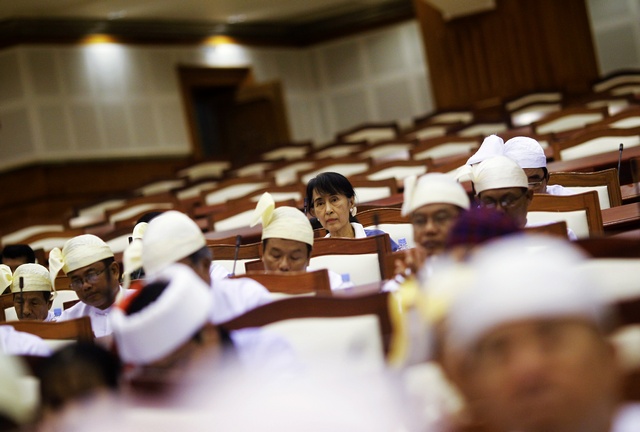Burma’s parliament agreed on Tuesday to extend a state of emergency for the central town Meikhtila, which was devastated by religious violence in March, despite warnings from opposition leader Aung San Suu Kyi.
At an emergency session held yesterday, an overwhelming majority of parliamentarians voted in favour of a motion to extend the decree, which hands the military extensive powers in the conflict-torn region, for an additional two months. But Suu Kyi, whose pro-democracy party holds only 42 seats in the military-dominated legislature, urged her colleagues to exercise caution.
“An [executive] ordinance should be approached with a great deal of caution. There is a huge difference between law and order, in fact, one can say these are opposite from one another,” said Suu Kyi.
“The law is a set of rules recognised by the public as fair and necessary, while orders are administered by authorities with or without approval by the public.”
State media reported that 521 out of the 558 parliamentarians present voted in favour of the motion. But it is unclear whether the democracy icon, who called for greater accountability of the military during states of emergency, was among the dissenting voters.
President Thein Sein issued the initial order on 22 March, three days after riots erupted between Buddhist and Muslims in Meikhtila, claiming over 40 lives and displacing 13,000 people.
During a speech in Washington DC on Monday night, Thein Sein called for an end to sectarian violence in the country.
“Myanmar people of all ethnic backgrounds and all faiths – Buddhists, Muslims, Christians and others – must feel part of this new national identity,” said the Burmese president according to a report in the AFP.
“We must end all forms of discrimination and ensure not only that intercommunal violence is brought to a halt, but that all perpetrators are brought to justice.”
But a report published by Physicians for Human Rights on Monday, detailed extensive evidence of state complicity in the massacre of 20 Muslims students during the Meikhtila riots. The government has also come under fire for failing to prosecute key Buddhist instigators behind the March violence, which primarily targeted Muslim communities and spread across several townships in central Burma.
While some of Meikhtila’s displaced Muslim population have begun to return home, residents say the trust that was once common between the two communities has disintegrated.



